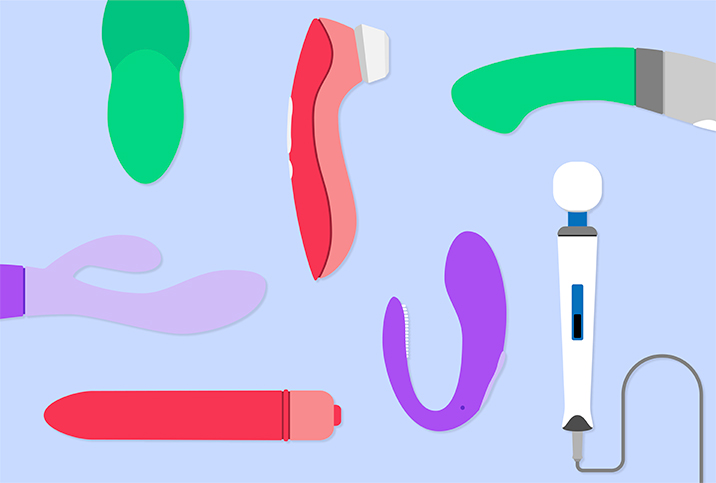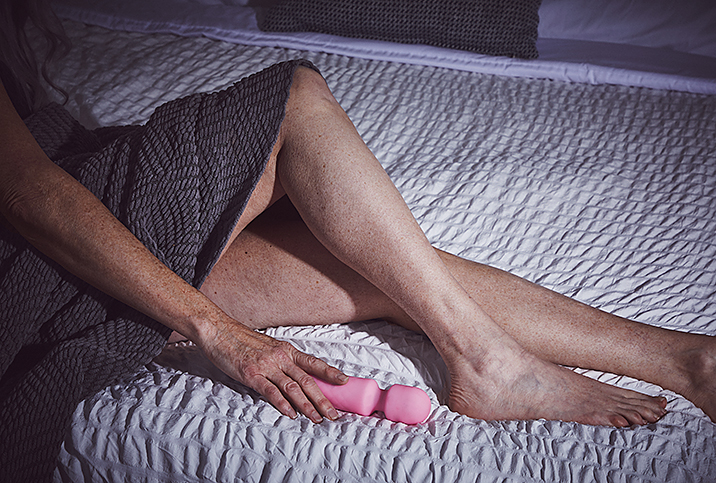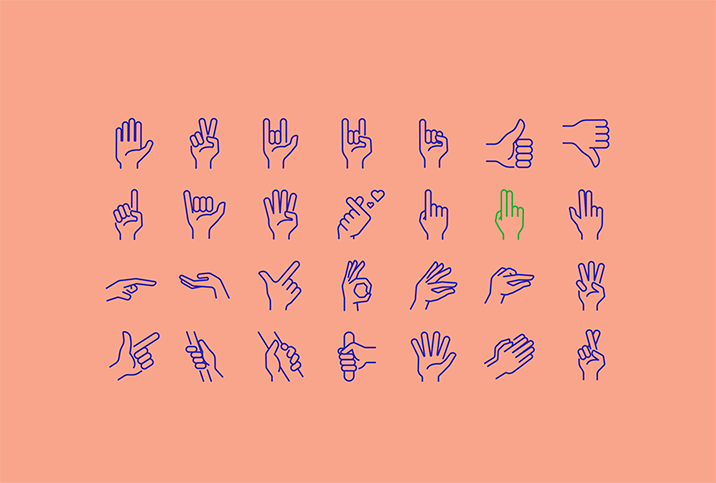Can I Get Addicted to My Vibrator?

Dead vagina syndrome: It started with actress Olivia Wilde quipping that her "vagina died" in her first marriage and morphed into a viral Internet myth about frequent vibrator use causing permanent genital damage. Supposedly, this "syndrome" makes orgasms impossible to achieve without the help of sex toys, leading to "vibrator addiction." But is there any truth to this idea? Can you really get addicted to your vibrator?
Vibrators are helpful tools in both our solo and partnered sex lives. Women who use vibrators during masturbation and partnered sex report greater sexual satisfaction than those who only use them for solo play or never at all, according to a 2019 study published in the Journal of Psychology and Sexuality. "Physiologically, emotionally, psychologically—there's a lot that goes into having an orgasm," said Searah Deysach, owner of the sex toy store Early to Bed. "For some people, using a vibrator is a key to unlocking that pleasure."
Sex toys can also be teaching aids. "Vibrators can help people learn more about their genital anatomy," said OB-GYN Kelly Culwell, "and can help people who have difficulty with orgasm—either during partnered sex or masturbation—learn what areas bring pleasure." Culwell said people using certain SSRIs, which can cause a decrease in libido, "can benefit from including vibrators during masturbation" and that this "can also be true for disabled people who may not have the dexterity for manual genital stimulation."
OB-GYN Sheryl A. Ross agreed. "Medical conditions and aging can ruin your libido, decrease blood flow to the clitoris and vagina, dry up your normal vaginal secretions and cause pain with sexual penetration," she said. "A vibrator can be just what the doctor ordered."
According to Deysach, relying on vibrators for sexual pleasure is normal and healthy. "If someone begins using a vibrator and their orgasms become way easier to achieve and if their orgasms become more powerful, then that person might want to use a vibrator every time they orgasm," she said. "That shows us that vibrators are doing what they’re supposed to do."
Do vibrators cause permanent genital numbness? The notion that vibrators can decrease clitoral or vaginal sensitivity over time isn't proven, according to Culwell. "I have yet to see any evidence that the proper use of a vibrator can cause any permanent damage," she said. She's backed up by a 2009 study in the Journal of Sexual Medicine, which found that of the roughly 16 percent of vibrator users who experienced genital numbness, only 0.5 percent experienced numbness that lasted for a day or more.
Numbness is very unlikely to indicate permanent damage, but if your vibrator is causing temporary numbness or discomfort, Deysach recommended switching to a lower speed.
Women who use vibrators during masturbation and partnered sex report greater sexual satisfaction than those who only use them for solo play or never at all.
What about retraining your clit to orgasm without a vibrator? Deysach said most vibrator users can still reach orgasm through partnered sex without toys, but she acknowledged those orgasms might feel less satisfying if you're used to climaxing with a vibrator. "The sensations that bodies can produce on other bodies are not as intense as the sensations vibrators produce," she explained, "so using a vibrator teaches your body that there’s more that you can get out of your orgasm."
If you want to retrain your body to more easily orgasm without the help of sex toys, Ross recommended decreasing your vibrator use over time. "Variety is important in the bedroom, otherwise your body will only want one way to orgasm," she said. It can help to give yourself plenty of time to get aroused before toy-free masturbation or sex, Deysach added.
But if you find you need to use a vibrator to orgasm, that doesn't mean you're "addicted" to your toy or have a "dead" vagina. "Vibrator addiction is an idea perpetuated by people who don't want women to access the powerful sexual experiences that vibrators offer," Deysach said, and Culwell agreed there is "no biological reason why someone would need to quit using a vibrator."
Ross agreed that vibrators don't cause harm but still advocated mixing up your pleasure routine. "[Moderation] should always be exercised," she said, "even when using a vibrator."


















